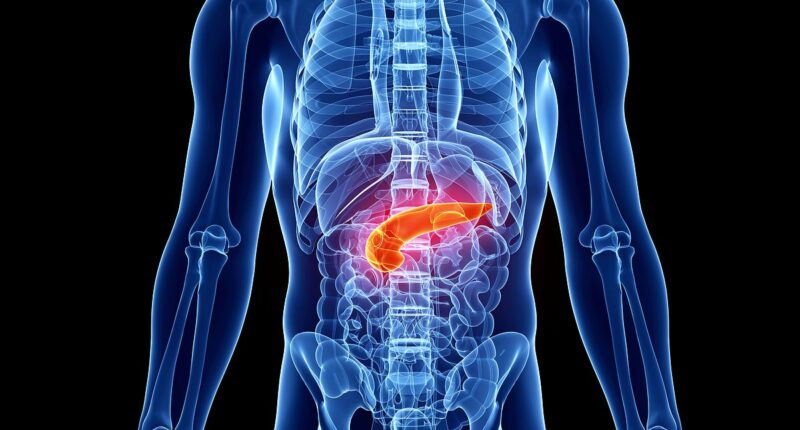Share this @internewscast.com
Smoking could dramatically increase your risk of developing one of the world’s deadliest cancers, new research has revealed.
Pancreatic cancer—dubbed a ‘silent killer’ due to its subtle symptoms—kills just over 10,000 patients every year, about one death every year.
And by 2040, cases are expected to hit record highs with 201,000 cases of pancreatic cancer expected to be diagnosed.
It is typically caught at late stages, as warning signs are easily mistaken for other problems.
But now US researchers say that GPs should be screening smokers more closely for pancreatic cancer development—in the hope of preempting symptoms.
Professor Timothy Frankel, a surgical oncologist and the lead author of the study, mentioned, ‘It’s possible that smokers who develop pancreatic cancer may require a different treatment approach.’
‘Although there isn’t an effective screening method, it’s important for smokers to be informed about potential symptoms and to consider visiting a high-risk clinic.’
The study, which was published in the journal Cancer Discovery, involved researchers from the University of Michigan Health Rogel Cancer Centre discovering a particular cell that reacts to the cancer-inducing toxins present in cigarettes.

Researchers found that smoking not only increases the risk of pancreatic cancer, but makes outcomes worse
The researchers started by exposing mice with pancreatic tumours to toxic chemicals found in cigarettes, known to increase the risk of cancer.
Their aim was to understand the effects of these toxins on Interleukin 22 (IL22)—a protein known to have a significant role in the development of tumors.
They found that the toxin dramatically changed the way tumours behaved in the body, increasing the rate of cancer progression.
‘It was really quite dramatic,’ Prof Frankel said. ‘The tumours grew much bigger and metastasized throughout the body.’
But interestingly in mice with no immune system, the carcinogen did not affect tumour growth.
From here, the researchers concluded that the carcinogen was working within the immune system to boost tumour growth
They discovered that a type of immune cell, called T-regulatory cells, or Tregs, was key to the process.
These cells were found to both produce IL22 and suppress the body’s natural ability to fight tumours.

Pancreatic cancer remains one of the least survivable forms of the disease and worryingly its on the rise. Source for data: Cancer Research UK
Prof Frankel described this as a ‘two-pronged attack’.
‘By removing all the Treg cells from the mice, we completely negated the tumor-promoting ability of the cigarette chemical,’ he elucidated.
The researchers confirmed their results in human cells, some of which were taken from patients with pancreatic cancer.
As expected, the study revealed that smokers afflicted with the disease possessed a higher number of Treg cells compared to non-smokers, due to the toxin boosting the levels of IL22 proteins in their bodies.
The researchers were further able to show that an inhibitor that blocks the harmful chemical found in cigarettes was effective at shrinking tumours.
Prof Frankel said: ‘If we are able to inhibit the super suppressive cells, we might also unlock natural anti-tumour immunity.
‘This could be further activated by current immunotherapies, which do not work well in pancreatic cancer because of the immunosuppressive environment,’ he added.
Whilst more research is needed to better understand the potential use of inhibitors that block this environmental toxin, the findings reveal a novel approach to treating pancreatic cancer patients with a history of smoking.
If pancreatic cancer is spotted early, before it spreads throughout the body, about half of patients will survive at least a year.
But if cancer has already spread beyond the organ—as happens for the majority of patients— only one in 10 patients will survive a year.
While pancreatic cancer is most likely to strike people over the age 75—younger groups can also get the disease.
Last year the Daily Mail highlighted a ‘frightening’ explosion of young women developing the disease.
Rates of pancreatic cancer have soared by up to 200 per cent in women under the age of 25 since the 1990s.
While numbers remain low, oncologists cannot explain the surge in young women, with no such spike noted in men of the same age.
Overall, incidences of the disease have increased by around 17 per cent in Britain over the same timespan, with soaring obesity rates and environmental factors suspected to be behind the trend.
Potential symptoms of pancreatic cancer include jaundice, where the whites of the eyes and skin turn a yellow hue, alongside itchy skin and darker urine.
Other possible signs include loss of appetite, unintended weight loss, constipation or bloating.
While these symptoms are unlikely to be cancer it is important that they are checked out by a GP early just in case, especially if people have had them for over four weeks.
The pancreas is a tadpole-shaped organ that forms part of the digestive system and also performs a crucial role in hormone regulation.
It is located just behind the stomach and is about 25cm in length.
In its digestive role, it helps produce enzymes that help the body break down food into the nutrients it needs.
Charity, Cancer Research UK, estimates 22 per cent of cases of the disease are caused by smoking and 12 per cent by obesity.












